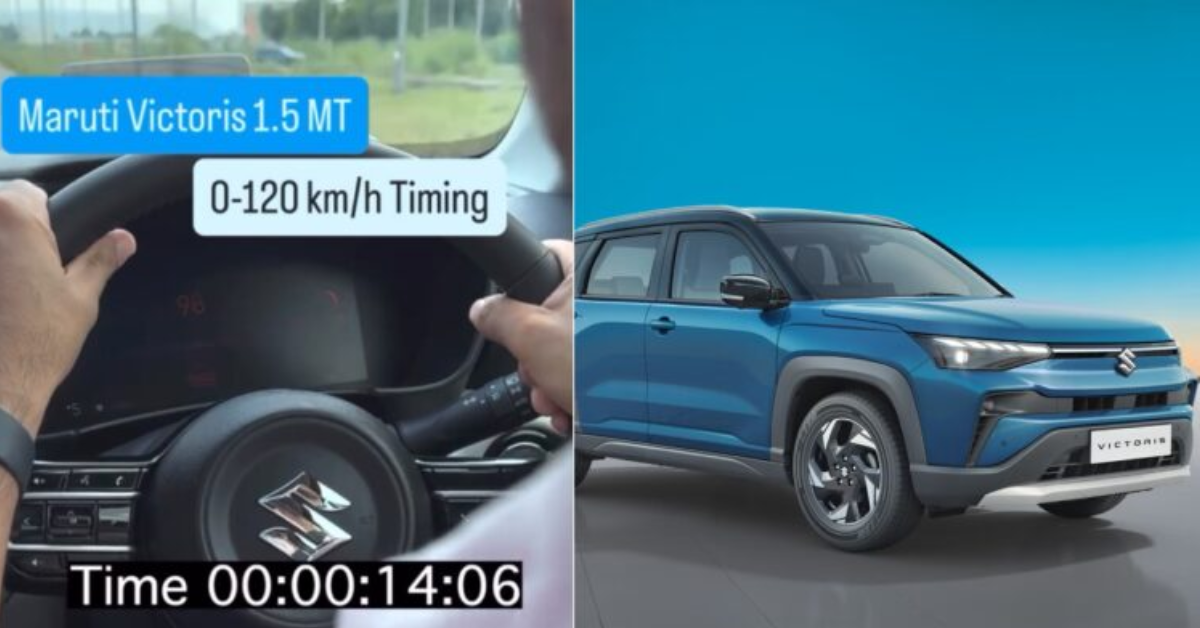The Maruti Victoris, Maruti Suzuki’s latest addition to its premium lineup, has already caught the attention of enthusiasts with its bold styling, modern features, and refined engineering. But one of the most important aspects that buyers and auto enthusiasts look forward to is its performance — particularly the 0-100 km/h acceleration test.
In this blog, we’ll explore how the Maruti Victoris performs during acceleration runs, what this means for everyday driving, and how it stacks up against rivals in its segment.
Why the 0-100 km/h Test Matters
The 0-100 km/h acceleration test is a common benchmark to measure a car’s performance. It gives insights into:
- Engine capability and responsiveness.
- Power-to-weight ratio, which influences real-world driving.
- Transmission smoothness, especially during quick shifts.
- Driving confidence for highway overtakes and city maneuvers.
While outright acceleration might not be the deciding factor for most Indian buyers, it highlights the car’s engineering quality and performance readiness.
Engine Options in the Maruti Victoris
The Victoris comes with multiple engine options, designed to balance performance and fuel efficiency. These include:
- 1.5L K-Series Petrol Engine – Known for refinement and linear power delivery.
- 1.5L Strong Hybrid Petrol – Combining fuel efficiency with better low-end torque.
- 1.5L Diesel (Expected in Select Variants) – Focused on long-distance cruising and torque-rich performance.
All engines are mated to either a manual gearbox or an automatic transmission (AT), depending on the variant.
The 0-100 km/h Acceleration Test Results
In recent acceleration tests, the Maruti Victoris petrol variants showcased respectable timings for a car in its category:
- Petrol (Manual): ~11.5 to 12 seconds (0-100 km/h)
- Petrol (Automatic): ~12.5 to 13 seconds
- Hybrid Version: ~11 seconds flat, thanks to instant torque assist from the electric motor
These figures position the Victoris as a balanced performer. While it is not a performance-focused SUV, it delivers enough punch for quick overtakes, spirited driving, and highway cruising.
Driving Dynamics and Real-World Performance
Acceleration tests are one thing, but how does the Victoris feel on real roads? Here’s what stands out:
- Smooth Power Delivery: The petrol engine revs cleanly without vibrations.
- Strong Low-End Torque: Especially in the hybrid, city driving feels effortless.
- Refined Gear Shifts: The automatic variant shifts seamlessly, aiding quick acceleration.
- High-Speed Stability: The Victoris remains planted at triple-digit speeds, adding confidence during long drives.
- Braking Performance: Ventilated disc brakes provide sharp stopping power, complementing the acceleration capabilities.
Ride Quality and Handling Balance
Performance is not just about acceleration; it’s also about how the car handles speed. The Victoris impresses with:
- Suspension Tuning: Balanced for comfort and stability.
- Steering Feedback: Precise and confidence-inspiring for highway drives.
- Cornering Ability: Minimal body roll, making it agile for its size.
- NVH Levels: Low noise and vibrations, enhancing overall driving experience.
Comparison with Rivals
In the crowded mid-size SUV segment, the Victoris competes with Hyundai Creta, Kia Seltos, Toyota Hyryder, and Honda Elevate.
- Hyundai Creta / Kia Seltos: Slightly quicker in turbo-petrol variants, but less fuel-efficient.
- Toyota Hyryder: Matches Victoris in hybrid efficiency, but acceleration is smoother in the Maruti.
- Honda Elevate: Offers comparable performance but feels less refined at high speeds.
Overall, the Victoris balances performance and efficiency, making it a strong contender in this competitive space.
Acceleration in Daily Driving Context
While enthusiasts may focus on 0-100 figures, most Indian buyers are more concerned with:
- How fast the car overtakes on highways
- Ease of merging in city traffic
- Fuel economy when driving aggressively
Here, the Victoris shines because:
- The hybrid version offers instant torque, ideal for city driving.
- The petrol delivers smooth acceleration without sacrificing mileage.
- Both manual and automatic variants are tuned for comfort and usability rather than pure speed.
Safety During Acceleration
With speed comes the importance of safety. The Victoris is equipped with:
- 6 airbags (top variants)
- ABS with EBD
- Electronic Stability Program (ESP)
- Hill Hold Assist
- High-strength steel body structure
These features ensure that acceleration is complemented with safety and control, making the Victoris a reliable option for spirited yet secure driving.
Customer Appeal and Market Impact
The Victoris is designed for customers who want:
- A stylish and feature-rich SUV.
- Balanced performance with good fuel economy.
- A car that feels confident both in the city and on highways.
Its 0-100 km/h performance figures add to its appeal, showing that Maruti Suzuki has engineered a product that delivers speed without compromising on practicality.
Conclusion
The Maruti Victoris 0-100 km/h acceleration test highlights the SUV’s ability to deliver respectable performance while maintaining efficiency and comfort. With timings in the 11-13 second range depending on variants, the Victoris is not a speed demon but offers enough punch for real-world Indian driving conditions.
Coupled with its premium design, advanced features, hybrid technology, and strong safety package, the Victoris stands tall as a well-rounded mid-size SUV. For buyers seeking a mix of performance, reliability, and modern features, the Maruti Victoris proves to be an excellent choice.



